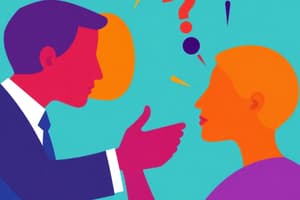Podcast
Questions and Answers
Which business function is responsible for ensuring all payments are collected promptly and efficiently?
Which business function is responsible for ensuring all payments are collected promptly and efficiently?
- Customer Service Department
- Technical / Operations Department
- Accounts Department (correct)
- Marketing Department
In the context of sales, what does 'Selling' primarily involve?
In the context of sales, what does 'Selling' primarily involve?
- Creating marketing campaigns to generate leads.
- Focusing on reducing costs for the business.
- Exchanging money for goods or services between a seller and prospective buyers (correct)
- Managing customer service inquiries and complaints.
What is the primary role of the Marketing Department concerning the Sales Department?
What is the primary role of the Marketing Department concerning the Sales Department?
- To provide after-sales support to customers.
- To ensure that all payments are collected promptly.
- To instill an initial interest in the customer, making them aware of the offering. (correct)
- To handle customer complaints and returns.
What is the role of Senior Management with regards to the Sales Department?
What is the role of Senior Management with regards to the Sales Department?
A Sales Executive is MOST likely to perform which of the following tasks?
A Sales Executive is MOST likely to perform which of the following tasks?
In the context of consumer behavior, what is 'need arousal'?
In the context of consumer behavior, what is 'need arousal'?
Which of the following is an example of a commercial source of information in the consumer buying decision process?
Which of the following is an example of a commercial source of information in the consumer buying decision process?
What is the role of the Accounts Department in relation to the Sales Department?
What is the role of the Accounts Department in relation to the Sales Department?
What distinguishes customer-oriented sales professionals from transactional sales professionals?
What distinguishes customer-oriented sales professionals from transactional sales professionals?
Which question is MOST relevant for sales professionals to ask when determining a sales commission structure?
Which question is MOST relevant for sales professionals to ask when determining a sales commission structure?
Which sales practice describes a gift that is given or negotiated for giving you the business?
Which sales practice describes a gift that is given or negotiated for giving you the business?
What is the definition of 'misrepresentation' in the context of ethical sales considerations?
What is the definition of 'misrepresentation' in the context of ethical sales considerations?
In the context of sales, what comprises a 'sales cycle'?
In the context of sales, what comprises a 'sales cycle'?
What does a sales enquiry generally represent?
What does a sales enquiry generally represent?
Aside from face-to-face interactions, what are other common channels through which organizations receive sales enquiries?
Aside from face-to-face interactions, what are other common channels through which organizations receive sales enquiries?
According to the provided content, what percentage of customers might abandon a purchase if they cannot use their preferred payment method?
According to the provided content, what percentage of customers might abandon a purchase if they cannot use their preferred payment method?
What are the four types of product features that customers consider?
What are the four types of product features that customers consider?
What is the difference between a product's feature and a product's benefit?
What is the difference between a product's feature and a product's benefit?
What is a flash sale, according to the information about sales promotions?
What is a flash sale, according to the information about sales promotions?
What is the main purpose of after-sales support?
What is the main purpose of after-sales support?
What is the focus of 'suggestive selling'?
What is the focus of 'suggestive selling'?
What is the main goal of cross-selling?
What is the main goal of cross-selling?
What is 'upselling' in sales?
What is 'upselling' in sales?
Select the BEST answer: Sales presentations should achieve which of the following?
Select the BEST answer: Sales presentations should achieve which of the following?
Which form of sales presentation involves talking to a prospect for the first time over the telephone or the Internet?
Which form of sales presentation involves talking to a prospect for the first time over the telephone or the Internet?
When handling customers' questions, what is one of the core steps a sales professional should take before answering?
When handling customers' questions, what is one of the core steps a sales professional should take before answering?
Which action is the MOST important when handling objections?
Which action is the MOST important when handling objections?
During which step in handling objections would a sales professional ask open-ended questions to gather more information?
During which step in handling objections would a sales professional ask open-ended questions to gather more information?
What percentage of a sales conversation is made up of body language and nonverbal communication?
What percentage of a sales conversation is made up of body language and nonverbal communication?
Which statement BEST describes effective sales communication?
Which statement BEST describes effective sales communication?
According to the material, what does customer retention refer to?
According to the material, what does customer retention refer to?
What is the MAIN advantage of having loyal customers?
What is the MAIN advantage of having loyal customers?
According to the material, what could regular contact with existing customers help with?
According to the material, what could regular contact with existing customers help with?
What does building rapport with clients involve?
What does building rapport with clients involve?
What are the typical examples of loyalty programmes?
What are the typical examples of loyalty programmes?
Assumptive close provides a prospect with which of the following?
Assumptive close provides a prospect with which of the following?
The steps include in handling customers' questions confidently and effectively do NOT include which of the following?
The steps include in handling customers' questions confidently and effectively do NOT include which of the following?
Buying signals can take place at several different steps of which journey?
Buying signals can take place at several different steps of which journey?
Which of the following is NOT included in the common ways of determining a customer's verbal queues when talking with someone on the telephone?
Which of the following is NOT included in the common ways of determining a customer's verbal queues when talking with someone on the telephone?
Based on what you have learned, which reason describes why top sales professinals should NOT speak too much during a presentation?
Based on what you have learned, which reason describes why top sales professinals should NOT speak too much during a presentation?
Flashcards
Selling Definition
Selling Definition
A transaction between a seller and prospective buyer (target market) where money is exchanged for goods/services.
Purpose of Selling
Purpose of Selling
Helps customers address/solve problems and satisfy their needs and wants. It generates revenue.
Senior Management Role in Sales
Senior Management Role in Sales
Sets sales targets and creates incentives for the sales department.
Marketing Department Role
Marketing Department Role
Signup and view all the flashcards
Customer Service Role
Customer Service Role
Signup and view all the flashcards
Accounts Department Role
Accounts Department Role
Signup and view all the flashcards
Technical/Operations Role
Technical/Operations Role
Signup and view all the flashcards
Sales Trainee Role
Sales Trainee Role
Signup and view all the flashcards
Sales Executive Role
Sales Executive Role
Signup and view all the flashcards
Account Manager Role
Account Manager Role
Signup and view all the flashcards
Regional Sales Manager Role
Regional Sales Manager Role
Signup and view all the flashcards
Vice President of Sales Role
Vice President of Sales Role
Signup and view all the flashcards
Consumer Behavior
Consumer Behavior
Signup and view all the flashcards
Need Arousal
Need Arousal
Signup and view all the flashcards
Information collection stage
Information collection stage
Signup and view all the flashcards
Information evaluation stage
Information evaluation stage
Signup and view all the flashcards
Purchase Decision
Purchase Decision
Signup and view all the flashcards
Post Purchase
Post Purchase
Signup and view all the flashcards
Transactional Sales Professionals
Transactional Sales Professionals
Signup and view all the flashcards
Customer Oriented Professionals
Customer Oriented Professionals
Signup and view all the flashcards
Partner B2B Sales
Partner B2B Sales
Signup and view all the flashcards
Ethics
Ethics
Signup and view all the flashcards
Bribes
Bribes
Signup and view all the flashcards
Misrepresentation
Misrepresentation
Signup and view all the flashcards
Price discrimination
Price discrimination
Signup and view all the flashcards
Tie-in Sales
Tie-in Sales
Signup and view all the flashcards
Reciprocity
Reciprocity
Signup and view all the flashcards
Sales Cycle
Sales Cycle
Signup and view all the flashcards
Sales Enquiry
Sales Enquiry
Signup and view all the flashcards
Sales Enquiry Channels
Sales Enquiry Channels
Signup and view all the flashcards
Product Availability
Product Availability
Signup and view all the flashcards
What is Pricing?
What is Pricing?
Signup and view all the flashcards
Product Style
Product Style
Signup and view all the flashcards
Product Function
Product Function
Signup and view all the flashcards
Product Experience
Product Experience
Signup and view all the flashcards
Product Quality
Product Quality
Signup and view all the flashcards
Benefits
Benefits
Signup and view all the flashcards
Suggestive selling
Suggestive selling
Signup and view all the flashcards
Cross Selling
Cross Selling
Signup and view all the flashcards
Upselling
Upselling
Signup and view all the flashcards
Study Notes
Sales Techniques & Engagement
- These notes pertain to sales techniques and engagement, relevant for April to June 2025.
- ITE College Central, East, and West compiled the information.
Unit 1: Identify Sales Prospect
- Selling involves a transaction between a seller and prospective buyers, exchanging money for goods or services.
- Selling addresses customer problems and satisfies needs/wants.
- The sales department collaborates with other departments to function effectively.
- Senior management sets sales targets and incentives for the sales department.
- Marketing instills initial customer interest, and the sales department encourages purchases.
- Customer service maintains existing customers and provides after-sales support.
- The sales department needs to be aware of required sales figures and understand company products/services.
- There are five steps in consumer buying decisions; arousal, information collection, information evaluation, the purchase decision, and then the post-purchase stage.
- Buyers can source information from personal, commercial and public sources.
- During information evaluation, customers assess products/services based on attributes, importance, and brand belief.
- The customer's attitude and involvement heavily influence the information evaluation stage.
- A purchase decision can be disrupted by negative feedback or unforeseen personal situations.
- In the post-purchase stage, customers compare products/services to expectations, influencing brand loyalty.
- Transactional sales professionals are guided by self interest and selfishness.
- Customer-oriented professionals provide solutions and care, checking satisfaction and future needs after sales.
- Partners (B2B) work continually to improve customers' operations, sales, and profits.
- Sales professionals' income depends on effort, performance, and rewards like commissions, bonuses, and trips.
- Ethics means adhering to principles and values of right and wrong.
- Ethical guidelines include providing excellent products/services, doing what is right, and not compromising beliefs.
- Unethical sales include bribes, misrepresentation, price discrimination, tie-in sales, and reciprocity.
- A sales cycle involves all activities associated with closing a sale.
Unit 2: Handle Sales Enquiry
- A sales enquiry represents the initial response from possible customers following an advertisement or sales campaign.
- Organizations can receive sales enquiries face-to-face, by telephone, and online.
- Organizations should welcome customers warmly, use positive gestures and smiling during face-to-face interactions.
- Providing assistance to customers in a personal manner requires customers to come to your location.
- Customer service requires the customer and a sales representative to be physically present at the same location.
- Making the companys website easy to use will likely encourage users to stay on your pages to boost enquiries and sales.
- Knowing what customers need is important, including price, availability, features, services, discounts, and warranties.
- Product availability matches item availability with customer need.
- Price is the value the customer sees in a product/service and is willing to pay.
- Retailers commonly accept cash and card, but should pursue as many payments as possible
- 50% of customers will abandon a purchase if they can't use their preferred payment method
- Style, function, experience, and quality are all important product features
- Product benefits can be actual or perceived, and can exist on three levels; physical, logical, and emotional.
- It’s important to emphasize benefits to increase sales.
- Key directional signals and knowledge of key attractions enhances service.
- Sales promotions increase sales, acquire new customers, and take advantage of opportunities.
- Common sales promotions include flash sales, “buy one get one”, discounts, and free shipping.
- Post-sales customer support involves a guarantee, warranty, upgrade, or repair service.
Unit 3: Sell Products and Services
- The sales process involves establishing needs, matching the product, overcoming objections, providing options, anticipating questions, and confirming sales.
- Key to establishing customer needs is to ask the right questions and listen.
- Objections can include concerns about prices, products, company, time or competition.
- Prepare answers for questions such as “Does this come in another color?” and “Is there a warranty?”
- Confirming the sale involves gaining commitment to buy.
- Suggestive selling involves offering products/services similar to the customer's initial interest.
- Offering extended warranties or add-ons enhances the initial purchase.
- Cross-selling involves offering related or complementary products/services.
- Bundling related products/services or discounted prices on bundled items helps cross-selling.
- Upselling involves persuading customers to buy upgraded or premium versions.
- Side-by-side comparisons or mentioning time-sensitive sales can encourage upselling.
- The main goal of sales presentations is to present a product or business opportunity and persuade purchase.
- Convincing sales presentations must introduce a business, create rapport, explain unique advantages, and motivate action.
- An elevator pitch presents your product or service persuasively in less than 2 minutes.
- Cold calls and emails allow sales teams to customize their pitch and gather information about the prospect.
- Canned presentations are memorized scripts while planned presentations are more conversational.
- Webinars are online presentations that allow sales teams to speak directly to hundreds of prospects.
- A sales professional should pause, understand the question, acknowledge merit, answer professionally, and check with customers when handling questions.
- Key is to understand why customers objects and handle them to make sales.
- Common factors for customers objections involve product knowledge, specific concerns and/or perceived problems.
- Show gratitude, empathize, discover what is going on through the use of open-ended questions and probe to confirm
- Verbal skills involve using words to share information, convey messages, and express ideas.
- Non-verbal communication includes body language and posture reflecting interests.
Communication Techniques
- Six points vital to communication in sales include assertiveness, authenticity, open-mindedness, empathy, clarity and listening.
- Effective communication helps earn loyalty; failure leads to dissatisfaction.
- Asking questions, displaying interest, adjusting style and avoiding bias are important.
- Non-communications involves non-verbal messages, facial expressions, and body language.
- Maintain non-verbal listening by looking interested, nodding, and attentive.
- Three questioning skills are closed, background, and probing.
Unit 4: Closing the Sale
- Closing a sale occurs when the prospect is committed to the purchase.
- Recognition of these behavioural cues increases the ability to close a sale.
- Buying signals present themselves in a variety of ways that include verbal and non-verbal communication.
- Methods for closing a sale include assumptive, minor point, alternative choice, direct, others including combination.
- Common closing mistakes include a bad attitude, poor preparation, not listening, lack of customization, remaining uncertain and talking too much even after the prospect has committed.
Unit 5: Build/Retain Sales Relationship
- Sales retention and relationship building encompass actions by a company to ensure customer satisfaction.
- Relationship building nurtures existing customer relationships to maximize lifetime value.
- It costs 5-25 times more to acquire a customer than it does to retain one.
- Customer retention refers to a brand's ability to gain repeat business from a customer rather than simply being retained.
- Customer loyalty happens when the customer buys from a brand consistently and encourages others to do so.
- Loyalty and retention is increased through relationship building, building rapport and exceeding expectations.
- Strategies for maintaining customers include building relationships, building rapport, being perceived as valuable by exceeding expectations and loyalty programs.
- To discover why customer are loyal, look at questions relating to attitudinal (how much you love the brand and behavioural (how many do you buy).
- With great rewards those with a high attitudinal and behavioural are considers true advocates, willing to refer to others.
- Companies want loyal customers for repeat business and lower costs, and minimize the threat of customers taking their business elsewhere.
- Customer loyalty also result in expansion, serving as a valuable source for new customers.
- Communication must be meaningful and consistent, and communication must be open both ways and the companies must keep their promises.
- Companies can strengthen customer retention if customers continue to perceive value after the initial sale.
- Types of perceived values include reliability, responsiveness, compassion and knowledge/assurance.
- To win customer loyalty, businesses should show that they have a personal touch, care about the environment etc
- Loyalty programs can provide unique value through exclusive rewards and personalized interactions.
Studying That Suits You
Use AI to generate personalized quizzes and flashcards to suit your learning preferences.





